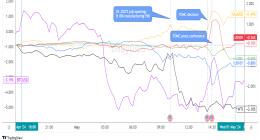Pandemics, the climate crisis and the algorithms used by tech giants feel too amorphous to squeeze into the dramatic form
“What the American public wants is a tragedy with a happy ending,” the American critic William Dean Howells once said (at least according to Edith Wharton). Maybe it’s what we all want, now, from our dramas. Who wants to sit down to make-believe tragedy at the end of a day brimming with real tragedy? Let the Netflix show – even if it plays with tragic tropes – end on an intriguingly unresolved note. Let no stage be bestrewn, with the utter finality that we see in Hamlet, with the corpses of pretty much all its cast. (After Hamlet’s ending, no one’s going to be asking for the spin-off series, Fortinbras Rebuilds Elsinore.)
The critic George Steiner declared tragedy dead in 1961, so perhaps its absence is hardly a surprise. One of his most pertinent points was how little purchase tragedy had had since the Athenians invented the form in the fifth century BCE. Tragedy, as a narrowly defined theatrical genre, had flowered at distinct moments, he argued, when both the sociopolitical and theatrical conditions were just right: on the Elizabethan stage, for instance, and in Scandinavia and Russia in the early 20th century.
Charlotte Higgins is the Guardian’s chief culture writer and the author of Greek Myths: A New Retelling



